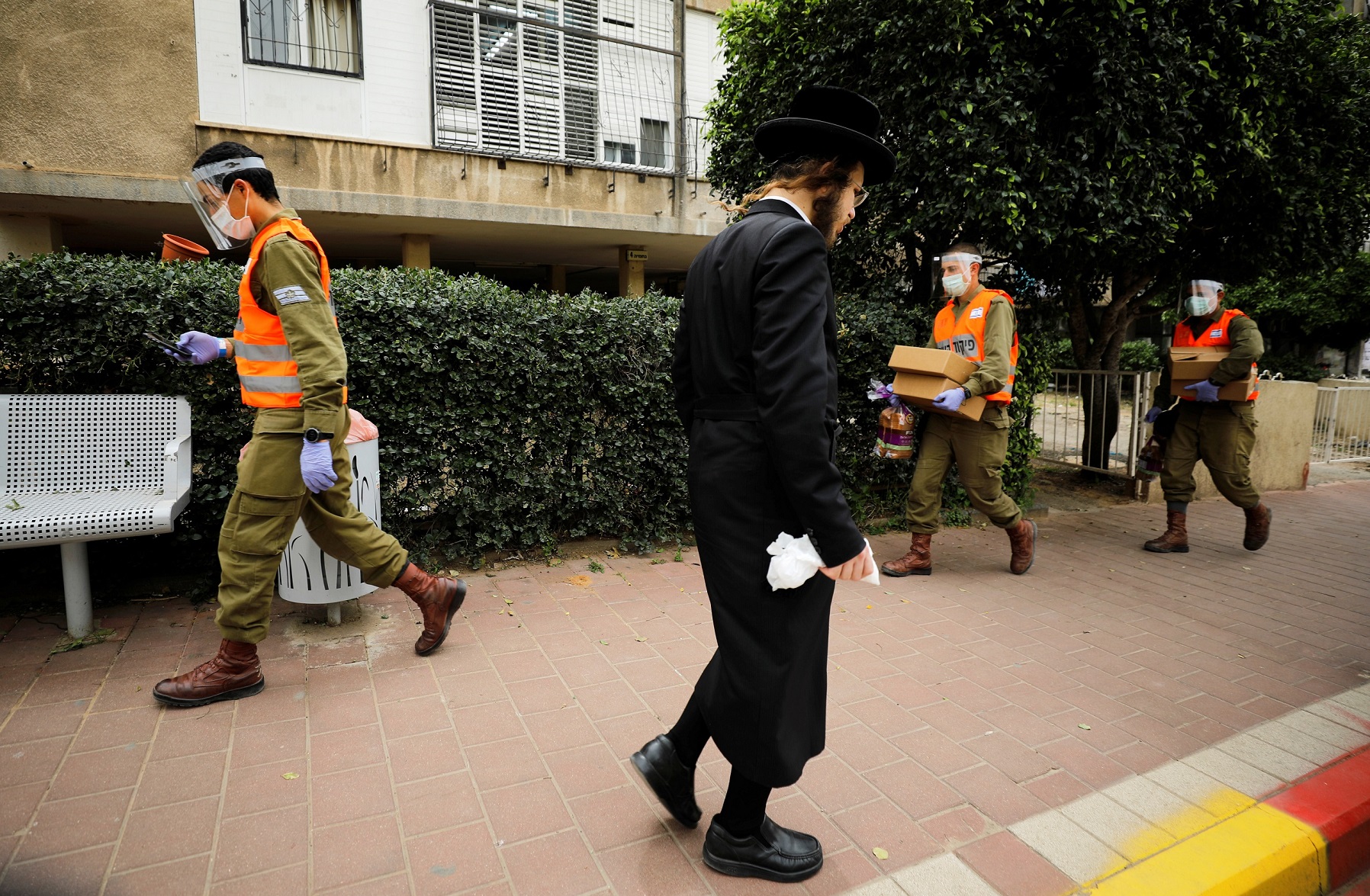Publications
INSS Insight No. 1356, July 30, 2020
Following the outbreak in Israel of a second wave of the Covid-19 pandemic and the government’s difficulty in successfully handling the combined health-economic-social crisis, growing voices – including among senior politicians within the governing coalition – are calling for the Ministry of Defense to be assigned the task of managing the campaign. Some are also calling explicitly for the IDF to assume direct responsibility for managing the crisis. This call was to be expected, especially given the high public trust in the IDF. The debate over the involvement of the security establishment and the IDF has a distinct political context. At the same time, whether it is appropriate for the IDF to deepen its involvement in this civilian campaign and whether there are lines within Israeli democracy the IDF should not cross must be carefully considered. We propose that the guiding directive on this critical matter be that the IDF provide all the assistance needed for the civilian authorities, but refrain from assuming overall responsibility for managing the crisis.
Following the outbreak in Israel of a second wave of the Covid-19 pandemic and the government’s difficulty in successfully handling the combined health-economic-social crisis, growing voices – even among senior politicians, including within the governing coalition – are calling for the Ministry of Defense to be assigned the task of managing the campaign. Some are also calling explicitly for the IDF to assume direct responsibility for managing the crisis. In a recent statement, Defense Minister Benny Gantz maintained that "the entire operation must be transferred to the [IDF’s] Homefront Command and the Ministry of Defense."
Similar calls were voiced even following the appointment of Prof. Ronni Gamzu as "project manager" of the coronavirus efforts, whose main job, as defined by the Prime Minister on July 23, 2020, is to cut the chain of contagion. Broad support for handing the crisis management to the IDF and the Defense Ministry is also emerging within the Israeli public. According to a July 15 survey by Channel 12 TV news, 57 percent of the public support the Defense Minister's position on this issue; only 20 percent oppose it.
The call to assign such comprehensive responsibility to the Ministry of Defense and the IDF is perhaps predictable, since the IDF enjoys an extremely high level of public trust. Although currently the arguments on this matter are anchored in a clear political context, it is important to weigh this proposal in principle by considering whether there are lines within the Israeli democratic framework that must not be crossed. The analysis below follows an earlier essay on this matter, of March 24, 2020.
The multifaceted crisis resulting from the Covid-19 pandemic has been exacerbated greatly by a severe, ongoing political crisis. This dangerous combination currently coincides with a sharp decline in the public’s trust in the government’s ability to contend with the combined crisis. According to a July 23 survey (Channel 13 TV news), 76 percent of the respondents believe the government is not handling the economic crisis well, while 60 percent are dissatisfied with the Prime Minister’s handling of the pandemic’s health crisis. An updated survey of Israel's Central Bureau of Statistics (July 26) reveals that only 47 percent of the respondents trust the government’s management of the pandemic. This is a 22 percent decline from a similar survey in mid-May.

The IDF undoubtedly possesses numerous relevant capabilities, particularly in the fields of logistics, human resources, command-and-control, and collection and processing of data, as well as the operational flexibility and relevant experience of the Homefront Command (HFC) in the civilian domain. These capabilities were displayed during the first wave of the pandemic, when the HFC played a prominent role in assisting civilians in need, reflecting the concept of "expanded responsibility" that guides its conduct in the civilian domain in times of emergency. Nonetheless, the call to assign the overall responsibility for managing the pandemic to the IDF is problematic for several reasons:
- It is not the IDF’s responsibility to manage crises in the civilian domain – especially when they are characterized by deep, long-term economic and social repercussions that have direct political consequences. Government decisions pertaining to the crisis are directly related to the current intense political environment that involves not only conflicting ideologies, but also coalition considerations. In such a sensitive political setting the IDF could find itself involved in circumstances – unnecessary and undesirable – that might lead to the military’s politicization, either in fact or in the public’s perception.
- The IDF must focus on its security missions (defending Israel and its borders, ensuring the country’s existence, and achieving victory in wartime) and may be called at any moment to address, with all its capabilities and undivided attention, a variety of security risks. Assuming the vast responsibility entailed in managing the Covid-19 pandemic, which is liable to continue for a long time and spawn unexpected challenges, such responsibility might divert significant resources and capacities from the IDF’s core missions. This is especially true today, when there are simultaneous security threats Iran, Hezbollah, and the Palestinians.
- The IDF is currently focused on containing the growing contagion in its own ranks and must isolate its commanders and soldiers from broad contact with civilians.
- Effective management of the complex coronavirus crisis requires special professional civilian skills and broad experience in the fields of public health, economics, welfare, and social services. The IDF command lacks substantive capacities in these domains.
- Even in fields closer to the IDF's strengths, such as collection and processing of data, the military's capabilities are not necessarily sufficient in all instances for the singular and challenging needs of the current civilian crisis. For example, although the IDF possesses robust skills in data management, they are hardly applicable to the diverse and dynamic civilian context. Even the Israel Security Agency, with all its skills and experience in monitoring and tracking individuals, has been deficient in implementing its advanced capacities for severing the chain of the Covid-19 contagion.
- The management of the combined crisis requires difficult decisions concerning the general public. Once the IDF assumes responsibility for managing the integrated campaign, it might find itself in conflict with civilians or with parts of the civilian population, possibly causing friction and antagonism in crucial military-civilian relations. This is especially true in light of the growing public discontent. Any IDF involvement in public protest and demonstrations, not to mention possible public disturbances, is a scenario that must be far removed from the military.
- Transferring overall responsibility to the IDF would also constitute public acknowledgement of the failure of the civilian structure. A way can and must be found to set up a civilian system that is more effective than the current one in managing the crisis, and ensuring orderly decision making processes and full implementation of the decisions taken. A strong national coronavirus administration (in contrast to the limited powers assigned to the recently appointed "project manager"), operating under the authority of the so-called coronavirus cabinet, should be able to address this need in an appropriate manner.
- All of these factors should be considered along with the basic imperative of democratic states, which repudiates placing the military in a leadership and decision-making position in civilian affairs, even if it is subordinate in one way or another to the political echelon.
The Covid-19 pandemic requires all stakeholders – individuals, communities, and state organs – to mobilize in order to contain the pandemic and minimize its severe short and long term consequences. However, incorporating the IDF, as part of the Ministry of Defense, in the campaign against the pandemic must be based on the following principle: the IDF should extend maximum assistance but not be assigned overall responsibility for managing the crisis, in part or in entirety. For example, compared to other developed countries, Israel is severely lagging in the epidemiological testing process. Including IDF soldiers in this critical effort, following brief professional training and working around the clock, could quickly and dramatically close the gap. Generally speaking, the IDF must extend the scope of its assistance to the civilian systems, mainly through the HFC, in accordance with the political echelon’s decisions, under close Knesset supervision. All its activities in the civilian domain should take place under full control of the civilian systems regarding all issues and at all levels, including the local authorities.



